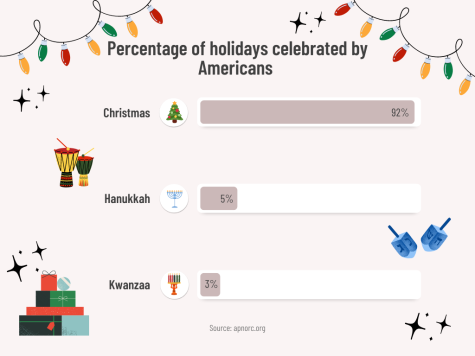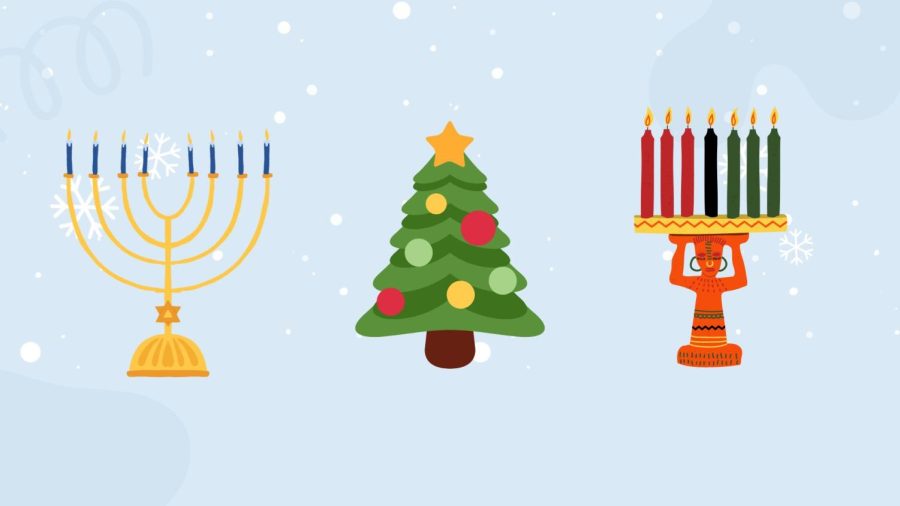Christmas movies, songs, and activities are upon us, and streets are filling up with beautiful lights as wintertime nears. But what about the other holidays that get celebrated during winter?
The holiday season is approaching, and most people look forward to celebrating Christmas. But, people tend to forget about other religious holidays celebrated around this time of the year, such as Hanukkah and Kwanzaa. Living in a diverse community with different cultural backgrounds, religious beliefs, and old family traditions means every household has something unique they look forward to doing as the holidays approach.
Christmas has many activities, such as decorations, books, movies, and songs. All of these aspects are for everyone, even those who do not celebrate Christmas.
“I have no connection to Christmas. In some sense, we need to stay away because we are afraid to lose our own culture, so we keep our children away from Christmas symbols. But if there is an office party, then I will participate,” said Daniel Wise, a professor at McGill University.
Many households celebrate Christmas for religious reasons, partaking in many activities to remind themselves why they celebrate it. Miranda Shen, a youth teacher at Bridgeway Church, does advent readings leading up to Christmas Day with her family and sets up a nativity scene with her kids to remind them of the Christmas story.
“I try to remember the religious reasons for Christmas because it’s ultimately about God coming down to be with us, to rescue us from a life without meaning,” Shen said. “I feel like when I lose that focus, a lot of things I do around Christmas can feel a bit empty.”

Besides Christmas, Hanukkah is another critical and popular holiday. It is an eight-day Jewish celebration that famously includes lighting a menorah, playing traditional games, and eating traditional food.
“I enjoy lighting the menorah with my family and saying the prayers together,” said Carlmont sophomore Charlotte Gruen, who celebrates Hanukkah.
Despite the spotlight leaning toward Christmas, Hanukkah is still represented in many ways.
“I don’t think of it as a particularly public celebration, but I’m happy that it has some public acknowledgment. For example, they display a menorah in the public square in Princeton,” said Peter Ozsvath, a professor at Princeton University.
Another winter holiday that many celebrate is Kwanzaa. It is an African American cultural holiday that is celebrated for one week. It honors African American heritage in the U.S., and is celebrated from Dec. 26 to Jan. 1. Kwanzaa contains gift-giving, feasting, and lighting a traditional candle each day to commemorate the seven principles of African culture.
Due to Kwanzaa’s cultural background, many people who celebrate it also celebrate Christmas. Kwanzaa was created in the 1960s to represent African American culture and is a significant winter holiday for those who celebrate.
Many who celebrate other holidays can balance their religious traditions while still celebrating Christmas to a certain degree. As holiday celebrations are not always linked to religion, Christmas can be a part of everyone’s holiday time.
“I don’t feel like I need to stay away from Christmas activities because they’re fun, and I watch Christmas movies with my family,” said Carlmont sophomore Oliver Diamond, who celebrates Hanukkah.
With all these celebrations and festivals going around, some households don’t celebrate any holidays during the winter. In any case, celebrations differ from household to household, and it is important to acknowledge other holidays people celebrate.
Whether it is Hanukkah, Kwanzaa, Christmas, or nothing, winter is an excellent time for families to get together and enjoy the season.













